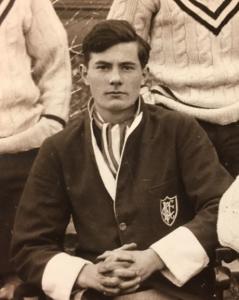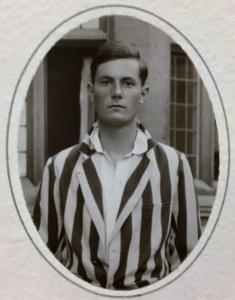
|

|
| Captain Alan Francis SALT (71025) | |
|
A Battery (Chestnut Troop), 1st Regiment Royal Horse Artillery Date of birth: 10th September 1916 Date of death: 29th November 1941 Killed in action aged 25 Buried at Tobruk War Cemetery Plot 7 Row J Grave 13 |

|
| Alan Francis Salt was born at Richmond in Surrey on the 10th of September 1916 the only son of Edwin Henry Francis, a produce broker, and Philippa Maud (nee Tucker) Salt, of The Red House, Holcombe, Dawlish in Devon. He was educated at Lancing College where he was in Seconds House from September 1930 to July 1935. He was an Officer Cadet in the Officer Training Corps and achieved Certificate A in 1933. He was a wicketkeeper for the Cricket XI in 1934 and 1935, was in the Football XI in 1933/34 and the Tennis Team in 1934 and 1935 being Secretary in 1934. He was a member of the Athletics Team as a high jumper in 1934 and 1935 and of the Fives Team from 1933 to 1935, being Captain in 1934 and 1935. He gained his School Certificate in 1934. On leaving school he went on to the Royal Military Academy at Woolwich and was commissioned as a 2nd Lieutenant in the Royal Artillery on the 27th of January 1937. At the outbreak of the Second World War Alan Salt was serving as the Survey Officer at the Regimental Headquarters of the 1st Heavy Regiment, Royal Artillery based at Fargo Camp in Wiltshire. They were moblised for war service on the 2nd of September 1939 and embarked their vehicles for overseas service at Newport on the 30th of September. The men were embarked on the 2nd of October and the regiment arrived at St Nazaire at 4pm on the 4th of October 1939 before moving to Bapaume. He was promoted to Lieutenant on the 28th of January 1940 and transferred to the 1st Regiment, Royal Horse Artillery on the 25th of April 1940. He was mentioned in despatches for his work during the France and Flanders campaign and was promoted to temporary Captain on the 1st of August 1940 and to Captain in 1941. At 1.30pm on the 29th of November 1941 the Germans launched an attack against Allied positions at El Duda in Libya. Throughout the early stages of their advance Alan Salt, who was operating as a Forward Observation Officer from a light tank, was giving British Headquarters a running commentary of their deployment during the early stages of the unfolding battle over his radio. By 3.15pm the Germans had added 88mm guns and infantry to their attack and it soon became clear to the defenders that this was to be an all out attempt to take the heights at Al Duda. As the Germans began to attack the positions of the 1st Battalion Essex Regiment, eight tanks of the 4th Royal Tank Regiment, which included some that were being used as mobile armoured command posts by the 1st Regiment Royal Horse Artillery, were ordered to make for the El Duda heights "in what was to be a last stand". An attack made on the flank of the ridge by 60 Italian tanks with supporting infantry was driven off and a further German attack at 4.55pm was driven off by artillery and disabled tanks whose guns were still able to fire. Despite heavy artillery fire and a short but bloody tank battle the German tanks reached the El Duda heights at 5.15pm. In this position the German tanks were now very close to the positions of the 1st Regiment Royal Horse Artillery which were being protected by a company of 2/13th Battalion Australian infantry. At around this time Alan Salt's tank, guns blazing, was hit by a shell which knocked it out and killed him. At 6.18pm in fading light the British armour had not yielded a yard of ground and the Germans brought up anti tank guns which began to pick off the defending tanks which were now outnumbered four or five to one. At 11pm the British and Australians supported by Matilda tanks launched a counterattack which threw the Germans back causing heavy casualties among their ranks and forcing them to give up the gains they had made during the day after eleven hours of heavy fighting. He is commemorated on the war memorial at Dawlish in Devon and on the Teignmouth war memorial. |
|
 | |
| Seconds House |
Back